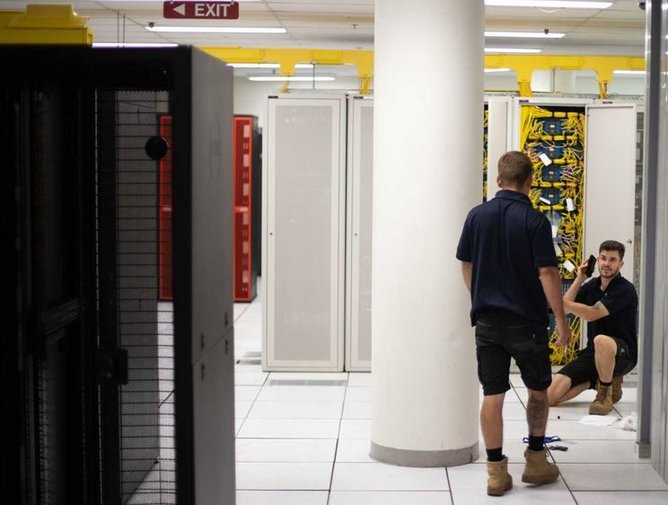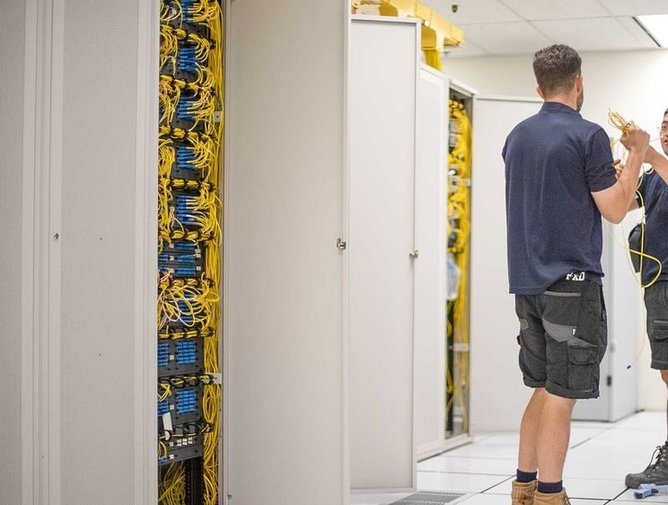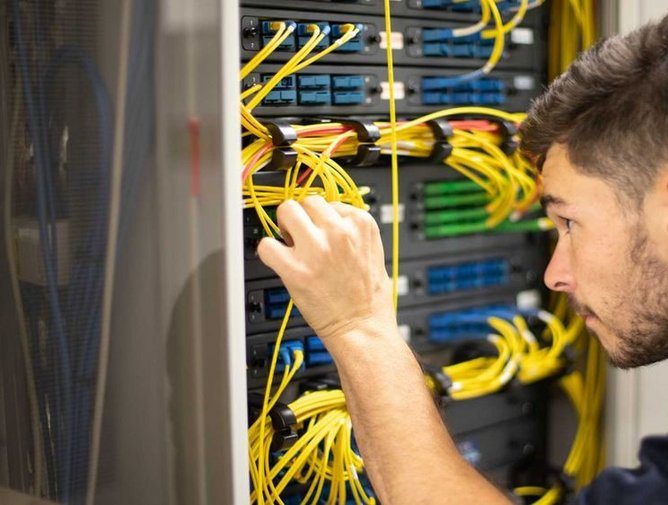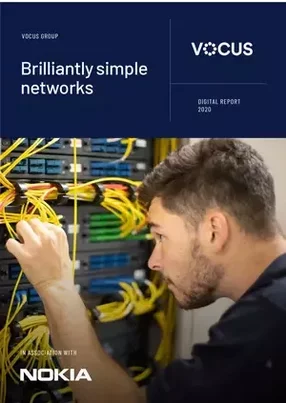Vocus’s mission is most certainly a critical one. So much of the efficient working of government, infrastructure, business and communities across Australia and New Zealand depends on the reliable operation of the networks that manage them internally and connect them externally, and Vocus Group is the leading provider of these networks in the region. Its mantra is ‘brilliant made simple’; its aim is to give its clients a network that is reliable and simple while leaving them in control of their operations.
Founded in 2008, Vocus floated on the ASX since 2010, where it has grown organically and by acquisition, into a AUD$1.9bn company. We have frequently considered the vital strategic role played by technology in the telecoms industry today, and Vocus is no exception. CTO Vic McClelland joined the group in September 2018 at the invitation of Kevin Russell, current CEO of Vocus. His role is to define the technology strategy including how to combine Vocus acquisitions into the best fibre network in Australia and New Zealand – and with numerous large-scale acquisitions over the last five years he found plenty of legacy networks and systems to integrate. With more than 30 years’ experience and having held senior executive positions in Australia and Silicon Valley with major players including Vodafone, Hutchison, Ericsson and Telstra, Russell knew he had the right person.
“Vocus now has a very extensive fibre network across Australia, between and within the capital cities,” McClelland explains. “And we've also invested in building the Australian Singapore Network, a submarine cable that gives us international submarine capacity out of Australia, up into Asia, and into other countries such as the USA via swaps.” Acquisition at the time of mass consolidation driven by creation of the National Broadband Network some four years ago have given Vocus some amazing Fibre and Network assets.
As expected, acquisition comes with complexity. “We had around six separate Layer 2 and 3 networks with eight Business Support System (BSS) stacks, ll with separate vendors. At that level of complexity and juggling multiple separate contracts it is difficult and costly to grow capacity, difficult to innovate and build new products and takes more people to provision customer services. We had one of everything, just about and we don’t need that!”
Keeping things simple being part of the company mantra, Vocus has been rationalising where possible, migrating customers and shutting down some redundant systems. This saved some resources, however in late 2019, he and his team initiated the Future State Network, a three-year initiative to finally consolidate and modernise legacy systems. “This involves technology, people, processes and culture,” he explains. “On the technology side, we plan to build a brand new L2/3 network at the edge and points of interconnect and then migrate customers off our legacy Layer 2/3 networks to this new network. Our new network will be supplied by our chosen supplier Arista Networks. Doing it this way we have new inventory records to deal with rather than having to sort out historic records from each legacy system, which would be a huge task.”
Six months into the programme, the team have built the platforms and are creating a digital programmable network from end to end including integrating to Digital Portals and creating products in the new stack. “In some cases digital transformation projects digitise only the front end but leave the back end with manual processes. For the Vocus Future State program we are making sure that we are automating as much as possible end-to-end through the entire stack so that the customers experience is a true digital experience – for new orders as well as for assurance, all dynamic and delivered to the customers in real time.”
The Future State program is delivered in three steps. McClelland already has the capability to provision basic services within seconds. “Just now we're stitching together all of the capability around the offer and the digital experience before we launch our first dynamic provisioning product for our customers . When this phase is delivered customers will deal with us via a digital portal or APIs, enter their requirements, get a quote, then if accepted click to accept that and it will activate within seconds. Just like ordering something from Amazon!”
Step two he calls the partner ecosystem, this step gives Vocus the ability to implement partner products and services into the new Vocus product catalogue. Partner solutions will be offered to complete customer solution needs, orchestrated via the Future State platform in a similar way that Vocus connectivity products are provided using standard API’s. “For example, if a customer requests a virtual security function from a particular supplier along with their connectivity then we will be able to offer that to the customer and they will be able to order it. We can then dynamically connect it for them via our partner ecosystem capability, regionally or globally. International network providers will be able to provision capacity on our network in Australia and we'll be able to provision capacity on their network overseas dynamically via this capability as well.”
The third step is self-healing delivered through closed loop automation. This step will implement dynamic resolution of faults in the network or infrastructure by re-provisioning services then those faults occur. “If you can provision new services with intent, then you can reprogram those services with intent when a fault condition occurs, a little like what happens today inside Data Centres when a server fault occurs, there the system automatically redesigns all of the workloads without the customers application knowing.
“Once we implement this step the Future State Platform can redesign the customers solution on the fly to meet customers requested SLAs and automatically fix problems,” McClelland continues. “To truly deliver fundamental changes in customer experience, telcos like us need to implement digitalization end-to-end through the stack. So, that's what we'll be doing. We'll be moving from a digital front end with manual steps in the back-end to a fully automated end-to-end digital stack.”
“We have selected DGIT Systems to provide our Future State Ordering, Product Catalogue and Billing systems and Ciena Blue Planet orchestration platform to perform our infrastructure orchestration capability.”
Telecom Networks in Australia are seeing demand for flexing connectivity due to moves to hybrid-cloud connectivity, driven by the rapid growth of IoT and industrial automation, unforeseeable events such as the COVID-19 emergency causing huge segments of business to move to home working, and recent bushfires. “Delivering the Future State Network is a priority as it will improve Vocus capability to provide resilient and flexible solutions to our customers,” he says.
Future State will also help with putting data at the centre of decision making. “Today we have traditional data warehouses that provide reporting on things like churn management, financial analysis, sales opportunity management, and the like,” explains McClelland. “As we implement Future State we will implement AI capabilities that leverage data and analytics capabilities to provide a better experience to our customers.”
Australia has never placed more demands on its networks than today, following the recent bushfires and the current COVID-19 pandemic. The latter causes massive spikes in traffic as everyone who can works from home and even more data is electronically shared than before. At this time, says McClelland, he is really appreciative of the partners that support Vocus in normal times but really step up when things are tough. “Nokia is a key partner of ours on our inter-capital transmission network. We've relied on Nokia for many years and they have delivered through the good times and equally through tough times. We're currently going through a situation where we’re working closely with Nokia on the supply chain issues that they've got because of COVID-19 in Europe and they're just fantastic. They've been doing a great job for us and they will continue to be a key partner for us.” Cisco is also another dependable partner for Vocus providing our core network equipment.
For the Future State program Vocus has chosen that are not traditional telecom equipment suppliers. “We deliberately chose partners that were able to work with us in a flexible way and that shared challenger vision.” You don’t make progress without taking risks, insists McClelland. Vocus under the leadership of Kevin Russell is happy to be a challenger: the ideal environment for its energetic CTO.




